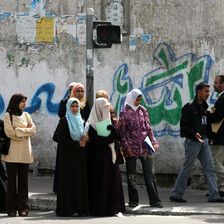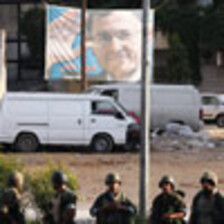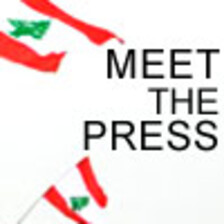The Electronic Intifada 10 June 2008
WASHINGTON, 9 June (IPS) - With the Iranian nuclear “threat” in the crosshairs, discussion of Palestinians or a Syrian-Israeli detente was virtually non-existent. But then again, one should not expect many overtures for peace when attending the annual policy conference for the American Israel Public Affairs Committee (AIPAC).
As more than 5,000 Jewish-American activists ascended Capitol Hill last week, the most common word circulating through panel discussions, daily briefings, and remarks made by high-level officials and presidential candidates was “security” — more accurately, Israel’s security.
And most of the tough talk, whether substantive or merely stylistic, was directed at a nuclear Iran and its presumed proxies — Lebanese Hizballah, Palestinian Hamas, and even Syria.
The policy prescriptions, outlined in a draft proposal of AIPAC’s policy agenda, urge, among other things, that the US “take all appropriate measures to halt Iran’s pursuit of nuclear and 152 other weapons of mass destruction and the means to deliver them.”
The language remains unsettling for many Democrats and war-weary US citizens, who view it as a license for the President George W. Bush administration to launch a military attack on Iran.
While pre-emptive missile strikes on Iranian nuclear facilities may seem unappealing — indeed, AIPAC’s talking points omit the discomforting mention of military force — the safer bet has been placed on sanctions, an endorsement of already existing efforts to isolate Iran economically.
“We should privatize the sanctions against Iran by launching a worldwide divestment campaign,” said Senator John McCain, the Republican nominee for the presidency, in a speech to the AIPAC conference.
“Years ago, the moral clarity and conviction of civilized nations came together in a divestment campaign against South Africa helping to rid that nation of the evil of apartheid,” he said, without a trace of irony.
“In our day, we must use that same power and moral conviction against the regime in Iran and help to safeguard the people of Israel and the peace of the world.”
The final “action agenda” is a consensus document produced by the organization’s executive committee, which includes representatives from major Jewish groups, as well as AIPAC board members.
The agenda also sets standards for Palestinian statehood that include an end to terrorism and recognition of Israel. Most controversially, it conditions an interim Palestinian state on “the change to a democratically elected Palestinian leadership untainted by terror,” something the Bush Administration feels it has more or less accomplished by propping up Palestinian Authority President Mahmoud Abbas.
The agenda not only promotes Israel’s “qualitative military edge” in the region. AIPAC’s lobbying efforts also insure a quantitative edge, as evidenced by Speaker of the House Nancy Pelosi’s remarks to the audience earlier in the week about a recent House bill expediting “essential” military equipment to Israel.
“The bill begins the implementation of a new 10-year memorandum of understanding on US security assistance to Israel and requires that Israel’s qualitative military edge be empirically assessed on an ongoing basis,” she said.
“The first installment of this increase, 170 million dollars, will be in the supplemental appropriation bill the House will consider soon, in fact, that we are considering now, so we can expedite this,” Pelosi said.
Israeli Prime Minister Ehud Olmert was met with a tepid response, but voiced his government’s support for renewed Syrian-Israeli peace talks, a relatively dramatic and recent development that was entirely ignored by AIPAC organizers.
“I know all too well the fears, suspicions and criticism which have always surrounded the Israeli-Syrian negotiations, and I do not take them lightly,” he said. “I can only assure you that any future agreement, if and when it is reached, will be backed by all the necessary security guarantees, and that I will never compromise on anything which could undermine Israel’s security or vital interests.”
Sen. Barack Obama’s appearance at the conference on Wednesday was the highlight.
College students roared and applauded, many crowding near the back of the aisles for the opportunity to see the historic candidate. He had finally clinched the Democratic presidential nomination, even if his adversary Hillary Clinton would not endorse him until Saturday.
But Obama was not pander-free; he gained fans among hardliners within the AIPAC leadership — and rousing applause from the crowd — for echoing one of the talking points of the lobby group’s policy agenda: “Jerusalem must remain the capital of Israel and must remain undivided.”
The statement was immediately rejected by Abbas, and Obama backtracked on the position the next day. The fate of Jerusalem forms part of the four big “final status” issues, which include the fate of Palestinian refugees, the borders of a Palestinian state, and the dismantling of Israeli settlements on the West Bank.
Palestinians — even those approved by the US and Israeli governments as “partners in peace” — would reject any final settlement in which they do not share at least part of Jerusalem. Critics say that no peace or negotiations can truly be advanced if the US, the presumptive peace broker, pledges to keep the holy city undivided.
The issue is a thorny topic in Washington too. The US Congress passed a law in 1995 describing the holy city as the “undivided” capital of Israel, a vote that preceded US visits by then Israeli Prime Minister Yitzak Rabin and Jerusalem Mayor Ehud Olmert to celebrate the 3,000th anniversary of biblical King David’s declaration of Jerusalem as the capital of the Jews.
Successive presidents, including George H.W. Bush and Bill Clinton, have used their executive powers to keep the embassy in Tel Aviv and backed negotiations between Israel and Palestinians on the status of Jerusalem.
On the same day Obama made his pledge, President Bush announced that he was suspending a move of the US Embassy to Jerusalem.
Outside the convention center, a fleet of passenger buses idled, ready to whisk the AIPAC faithful away to nearby Capitol Hill, where they planned to lobby 500 members of Congress for their cause.
All rights reserved, IPS - Inter Press Service (2008). Total or partial publication, retransmission or sale forbidden.





